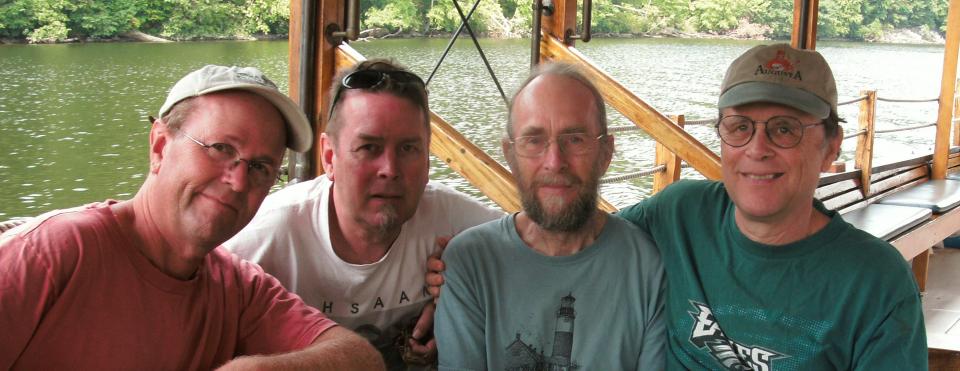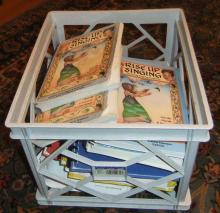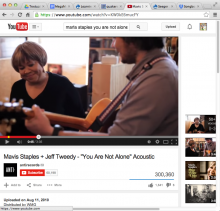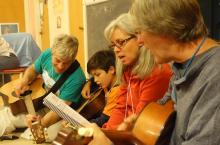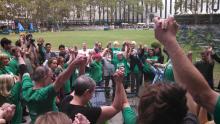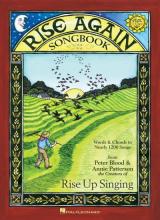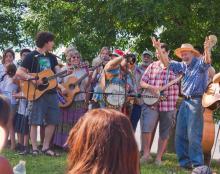Peter Blood
Early experiences with group singing. I grew up in a very musical family. We used to sing around the piano, on road trips, around the campfire.
In high school I began leading singing in a large youth group that met in the Ann Arbor Friends Meetinghouse. My brother Alan and I used to play quartets with my parents. I have a vivid memory of how folksongs knitted our group together, moved hearts deeply, articulated our values around peace and justice, and provided healing in times of trauma, such as after JFK’s death. Pete Seeger, Joan Baez, and Peter Paul & Mary were my heroes. These singers were helping large numbers of people around the world examine their values and dedicate themselves to the kind of world Friends longed for. I put together (and "mimeographed") songsheets for singing in this group, many of the songs on these sheets were later included in songbooks I helped create.
In 1966 I traveled to Mississippi to help with voter registration of poor rural African Americans. Each night we would gather with members of the local community to sing freedom songs in their community center. In 1968 after Martin Luther King was killed, I organized a Quaker group to live and work side by side with the Poor People’s Campaign in Washington DC. We sang alongside PPC participants in large meetings held in churches and in jail after participating in civil disobedience. Again, it was obvious the critical role song played in helping the Freedom movement maintain hope and courage in the face of enormous challenges.
At rallies in Washington DC, I watched Pete Seeger and others inspire and challenge large groups of people to commit themselves to struggle against war. I continued to lead singing as a form of community-building and empowerment in many of the groups I was active in over the years working for peace, economic justice or on environmental issues. I got to meet Joan Baez at a gathering of draft resistance leaders in 1969.
A songbook for group singing? All this led to a growing desire to use song to help others’ ability to experience healing, transformation, consciousness-raising, empowerment, deeper connections with others, and the capacity to sustain long-term struggle for a better world. I was frustrated that there were not good songbooks that included large numbers of the songs that were central to the transformational work many of us were engaged in.
As a result in 1973 I began working (with help from friends and fellow activists in a group called Movement for a New Society) on a songbook to facilitate this work. After six years I completed an informal songbook Winds of the People, which included words and chords to around 600 songs. The first printing was for a thousand copies printed on a tiny printing press, two pages at a time, by MNSer and draft resister, David Finke. (See David's letter telling about the book's challenging early history.) This songbook eventually sold 36,000 copies, mainly by Friends selling them out of their homes. Annie and I fell in love in 1981 and began leading singing together using this songbook.
Rise Up Singing. We wanted to turn Winds of the People into a fully legal “above ground” songbook that reach and serve a much wider audience with the same overall purposes. Pete & Toshi Seeger were instrumental in persuading Sing Out! Magazine to publish this book. We had a series of weekends where we gathered friends together to discern which songs should go in. We sang songs together to “test” the rightness of including them in the collection. Working on that songbook involved significant life changes for both Annie and myself, including leaving my nursing job at the time.
After the book was published in 1988 we traveled extensively leading sings with Rise Up Singing. We have led many hundreds of concerts and informal sings with tens of thousands of people around North America, England, and New Zealand, in groups as small as a dozen and as large as a thousand. When we lead singing we seek to offer up the sing to the use of the Spirit, discerning what songs are right to further the purposes that God intends for that occasion in that particular group. During sings one of us is frequently drawn inwardly to a particular song, sensing its rightness for this particular group at that particular moment. More often than not we receive powerful confirmation that the song we were drawn to was right.
Rise Again. In 1998, our publisher Sing Out! asked us if we would consider making a sequel to Rise Up Singing. We signed a contract, formed a song selection committee, and chose 1200 more songs to go in a new collection. But the project proved too big for Sing Out's resources and never came to fruitition.
Pete Seeger had been on the selection and he never gave up on the idea. He kept sending us suggestions for songs to include and asking us how the project was progressing. Although Pete (as its founder and original editor) had a deep affection for Sing Out, he finally told us around 2011 that he felt we should consider taking the project to another publisher who had the resources to bring the book out. We signed a new contract with Hal Leonard and revisited the songlist.
After about 3 years of full time work, we brought out the sequel (called Rise Again) in 2015. We did a release tour for the new book of over 50 singalong concerts. We were joined in these concerts by over 30 of the musicians who had songs in the new book.
Other work. After I graduated from college I spent six years doing anti-draft and anti-war work for groups working on peace and radical nonviolent social change. In 1976 I began nursing school and later earned a master’s degree as a psychiatric clinical nurse specialist. I left my nursing position in 1986 to do two things to work more than full time for two years completing work on Rise Up Singing. I have divided time since then between work as a nurse, family therapist, crisis worker, and nurse educator and work as a music editor (including editing Pete Seeger’s autobiography), songleader, spiritual formation leader and teacher of Quakerism. I taught at UMass School of Nursing from 2006-2012 and left that position to pursue work on the new book. I am now working full-time developing this site as a multi-faceted resource for those working to create change through song and traveling leading singalong concerts with Annie.
Spirituality. Both Annie & I are really involved in the Religious Society of Friends (Quakers) and our faith is really important to us and undergirds all the work we do. Most of the songs we lead are not explicitly spiritual. We believe, however, that the process of people discovering that they can lift their voices with others is in itself spiritual work. This often includes people who never sing because of early hurts like being told that they were tone deaf. The songs that we felt led to include in Rise Up Singing were ones that we believed served the basic mission of our work, with a heavy emphasis on songs of hope and transformation.
Personal life. We lived for twenty years in Tanguy Homesteads, a cooperative neighborhood located in Glen Mills PA. We have two terrific sons Eli and Ian. We moved to Amherst MA in 2006 and I adore this area. We have miles of woods, streams and hiking trails right behind our house. I'm a passionate contradancer and love swimming in a local pond every day during the summer.
What's am I doing today? Annie is now touring on her own or with other musicians. She has always been a much better singer and performer than I am! I help her set up conccrts.
I fill orders for books and CDs, work a lot on various resources on our website (such as "The Music Box" online song database). I also am deeply involved in interfaith solidarity work (as the co-convener of an interfaith network in our area) and on leading retreats and developing adult relgious education curricula for Quakers.
(note: The picture above this webpage is of me on the Connecticut River during a 65th birthday excursion with my brothers Jon, Lary, and Alan.)





